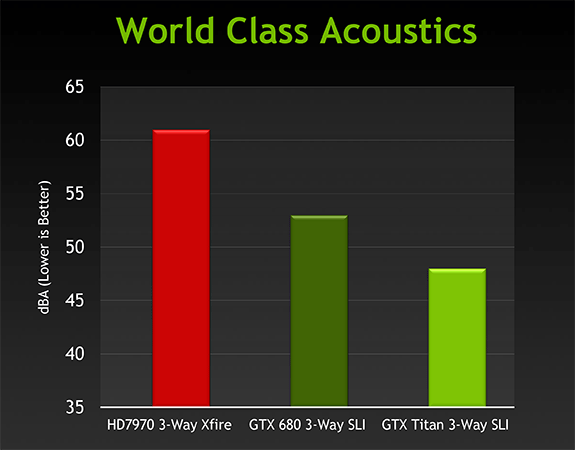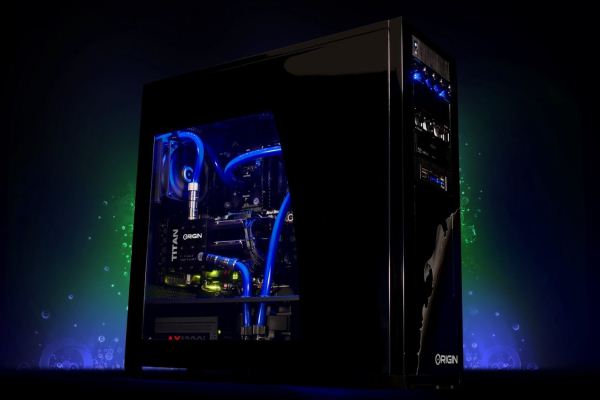NVIDIA's GeForce GTX Titan, Part 1: Titan For Gaming, Titan For Compute
by Ryan Smith on February 19, 2013 9:01 AM ESTOrigin’s Genesis: Titan on Water & More to Come
Wrapping up part 1 of our look at NVIDIA’s GeForce GTX Titan, we wanted to take a quick look at the tri-SLI system NVIDIA sampled to us for this article: Origin’s Genesis. Without the ability to publish performance data we can’t go into any detail and otherwise fully evaluate it, but what we can do is give you a sneak peek at what’s among the most unusual, and likely most powerful Titan systems on the market.
But first, as a bit of a preface, as we mentioned earlier in our article NVIDIA has been sampling reviewers with various SFF and tri-SLI systems to showcase their two boutique computer concepts. With the tri-SLI system it was not only intended to show off raw performance, but also to serve as a showcase of Titan’s build quality. You see, NVIDIA had told us that the acoustics on Titan were so good that a tri-SLI system could not only be a reasonable choice from a background noise perspective, but that it would be notably quieter than even a GTX 680 tri-SLI system, the latter being particularly hard to believe given GTX 680’s impressive acoustics and low power consumption.

Of course, things didn’t exactly go according to plan, and in a happy accident Origin went above and beyond NVIDIA’s original request. As the Genesis’ marquee feature is water-cooling, Origin went all-out in setting up our sample system for water-cooling, and not just on the CPU. Despite the fact that Titan was (and technically still is) an unreleased card, working alongside their waterblock supplier EKWaterBlocks they were able to get proper waterblocks for Titan in time to build our system. As a result our tri-SLI Genesis unexpectedly ended up being both completely water-cooled and factory overclocked.
The bad news of course is that because of the performance embargo we can’t tell you anything about the performance of the Genesis, other than to say that as fast as one Titan card is, three overclocked Titan cards running on water is even faster, sometimes by a massive margin. Furthermore, coupled with this is the fact that GPU Boost 2 was designed in part to better mesh with the superior cooling capabilities of water-cooling, taking advantage of the fact that water-cooled GPUs rarely hit their temperature limits. As a result what’s already a fast system can sustain performance that much higher thanks to the fact that we hit our top boost bins more often.
But we’re getting ahead of ourselves here…
| Origin Genesis Specifications | |
| Chassis | Corsair 800D |
| Processor |
Intel Core i7-3970X Extreme Edition, Overclocked To 4.9GHz, ORIGIN CRYOGENIC Custom Liquid Cooling CPU (6x4.9GHz, 32nm, 15MB L3, 150W) |
| Motherboard | Intel DX79SR |
| Memory | 16GB Corsair Vengeance DDR3 1866Mhz |
| Graphics | 3-WAY SLI NVIDIA GeForce GTX TITAN, ORIGIN CRYOGENIC LIQUID Cooling Solution and Professional Overclocking |
| Hard Drive(s) |
2x120 GB Corsair Neutron SSDs in RAID 0 1TB Western Digital Caviar Black SATA 6.0Gb/s, 7200RPM, 64MB Cache |
| Optical Drive(s) | 12X Blu-ray (BD) Disc Combo |
| Power Supply | 1.2 Kilowatt PSU Corsair |
| Networking | On-Board Intel |
| Audio |
Realtek ALC892 Speaker, line-in, mic, and surround jacks |
| Front Side |
Power button |
| Top Side | - |
| Operating System | Windows 7 Ultimate 64-bit |
| Dimensions |
16.2" x 4.6" x 16" (412mm x 117mm x 407mm) |
| Warranty |
1 Year Part Replacement and 45 Day Free Shipping Warranty with Lifetime Labor/24-7 Support |
| Pricing | MSRP of review system: ~$7000 |
We’ll have more on Thursday, including performance data for what so far is turning out to be a ridiculously fast tri-SLI system. So until then, stay tuned.











157 Comments
View All Comments
WhoppingWallaby - Thursday, February 21, 2013 - link
Dude, you have some gall calling another person a fanboy. We could all do without your ranting and raving, so go troll elsewhere or calm down a little.CeriseCogburn - Sunday, February 24, 2013 - link
Oh shut up yourself you radeon rager.You idiots think you have exclusive rights to spew your crap all over the place, and when ANYONE disagrees you have a ***** fit and demand they stop.
How about all you whining critical diaper pooping fanatics stop instead ?
IanCutress - Tuesday, February 19, 2013 - link
It's all about single card performance. Everything just works eaier with a single card. Start putting SLI into the mix and you need to take into account for drivers, or when doing compute it requires a complete reworking of code. Not to mention the potentially lower power output and OC capabilities of Titan over a dual GPU card.At any given price point, getting two cards up to that cost will always be quicker than a single card in any scenario that can take advantage, if you're willing to put up with it. So yes, two GTX 680s, a 690, or a Titan is a valid question, and it's up to the user preference which one to get.
I need to double check my wallet, see if it hasn't imploded after hearing the price.
wreckeysroll - Tuesday, February 19, 2013 - link
lost their minds?how about fell and cracked their head after losing it. Smoking too much of that good stuff down there in California.
How stupid do they take us for. Way to thumb your customers in the eye nvidia. $1000 on a single gpu kit.
Good laugh for the morning.
B3an - Tuesday, February 19, 2013 - link
Use some ****ing common sense. You get what you pay for.6GB with 386-bit memory bus, and a 551mm2 size GPU. Obviously this wont be cheap and theres no way this could be sold for anywhere near the price of a 680 without losing tons of money.
Nvidia already had this thing in super computers anyway so why not turn it in to a consumer product? Some people WILL buy this. If you have the money why not. Atleast NV are not sitting on their arses like AMD are with no new high-end GPU's this year. Even though i have AMD cards i'm very disappointed with AMD's crap lately as an enthusiast and someone who's just interested in GPU tech. First they literally give up on competitive performance CPU's and now it's looking like they're doing it with GPU's.
siliconfiber - Tuesday, February 19, 2013 - link
Common sense is what you are missing.GTX 580, 480, 285 were all sold to for much less than this card and were all used in HPC applications, had the same or much bigger dies sizes, and the same or bigger bus. DDR memory is dirt cheap as well
I have seen it all now. Largest rip-off in the history of video cards right here.
Genx87 - Tuesday, February 19, 2013 - link
Oh look I have never seen this argument before. Biggest rip off in history of video cards. Pre-ceded only by every high end video card release since the introduction of high end discrete GPUs. And will remain a ripoff until the next high end GPU is released surpassing this card ripoff factor.Blibbax - Tuesday, February 19, 2013 - link
It's not a rip off because you don't have to buy it. The 680 hasn't gotten any slower.Just like with cars and anything else, when you add 50% more performance to a high-end product, it's gunna be a lot more than 50% more expensive.
johnthacker - Tuesday, February 19, 2013 - link
The largest rip-off in the history of video cards are some of the Quadro cards. This is extremely cheap for a card with so good FP64 performance.TheJian - Wednesday, February 20, 2013 - link
GTX580 (40nm) was not in the same league as this and only had 3b transistors. Titan has 7.1B on 28nm. 512cuda cores compared to 2880? It came with 1.5GB memory too, this has 6. etc etc..The 580 did not run like a $2500 pro card @ a 1500 discount either. Also a chip this complicated doesn't YIELD well. It's very expensive to toss out the bad ones.Do you know the difference between system memory and graphics memory (you said ddr). They do not cost the same. You meant GDDR? Well this stuff is 4x as much running 6ghz not 4ghz.
Ref clock is 876 but these guys got theirs to 1176:
http://www.guru3d.com/articles-pages/geforce_gtx_t...
The card is a monster value vs. $2500 K20. Engineering is not FREE. Ask AMD. They lost 1.18B last year selling crap at prices that would make you happy I guess. That's how you go out of business. Get it? They haven't made money in 10yrs (lost 3-4B over that time as a whole). Think they should've charged more for their cards/chips the last ten years? I DO. If Titan is priced wrong, they will remain on the shelf. Correct? So if you're right they won't sell. These will be gone in a day, because there are probably enough people that would pay $1500 for them they'll sell out quickly. You have to pay $2500 to get this on the pro side.